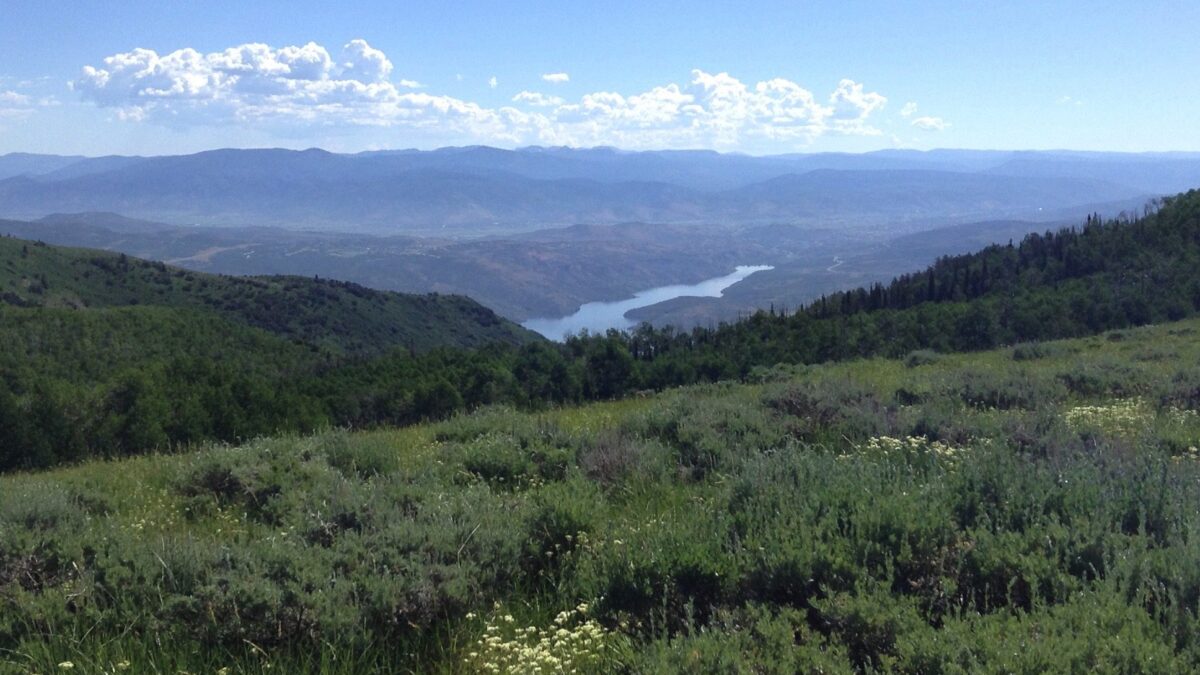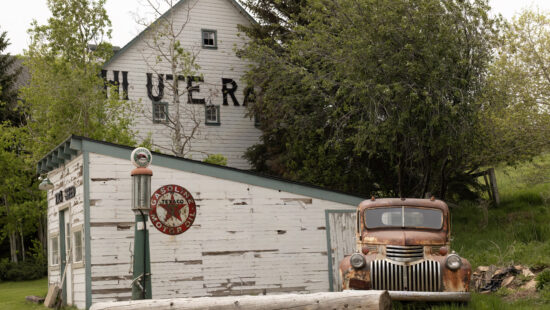Environment
Mayflower developers establish conservation preserve for 3,000+ acres in Wasatch Back

The newly established protected area in the Wasatch Back. Photo: Utah Open Lands
WASATCH COUNTY, Utah — It was announced on Friday that Utah Open Lands was granted a 3,100 + acre conservation easement donation, west of Jordanelle Reservoir, from an affiliate of Extell Development.
The conservation area will be known as the Forty-Fifth Star Conservation Preserve, and will allow significant regional trail and recreation connections, protecting this important conservation value, as well as preserving important wildlife habitat and ecosystems.
Mayflower Mountain’s EX Utah Development LLC and its affiliated companies, founded by Gary Barnett, have owned the property for several years, and early on became passionate about conserving the donated land for future generations protecting wildlife habitat and creating opportunities for the public to recreate on the property in ways that have never before been possible. At the same time, the conservation easement eliminates residential and hotel development in the donated areas, preserving the donated property for open space and outdoor recreational opportunities for the public in perpetuity.
The donation increases open space reserves within the Wasatch Back.
The Forty-Fifth Star Conservation Preserve lies at the intersection of two counties and several open land reserves making its protection applicable to public regional recreational trail system connections and habitat connectivity. The recreational trail system will create non-winter recreational opportunities as well as augmenting regional trail systems and dispersing public use in the area. Initial trails constructed on the Forty-Fifth Star Preserve will be opened to the public as soon as fall of 2023.
A broader vision
When the Extell entities acquired the Property, it came with significant approved density allocations and the ability to develop various enclaves of residential, commercial and other uses on the mountainside. After the acquisition, Barnett became enamored with the beauty and open nature of the acquired land and went to work to develop a plan to preserve open space while enhancing public recreation within a resort community.
“Perhaps it isn’t the best business decision to pay for land based on its development rights and then turn around and retire those rights in favor of conservation,” Barnett said in a statement. “In many ways, the Forty-Fifth Star Preserve succeeds in retiring development rights while balancing the need for publicly accessible recreation within an overall mountain community,” continued Barnett, who acknowledged that Utah’s growing recreation popularity and increasing real estate values were what initially attracted his attention, but that balancing the needs of increased housing and real estate demands with quality of life concerns were a motivator in his decision to retire development units. “I was struck by the scale of the Wasatch Back and just how many people get out into the mountains, it is impressive, and I felt some of that experience should just be protected.”
Barnett acknowledged that even when there were substantial pressures to foreclose the public from having eventual recreational access to the land that he saw a significant public purpose and opportunity for preservation.
A team decision
The ultimate decision to conserve the land was a team decision.
“There are a lot of us in the local community that make our living in the real estate industry,” Brooke Hontz, Extell’s vice president of development, said in a statement. Hontz, a member of the Park City Open Space Advisory Committee and a former Park City Planning Commissioner, lauds the commitment that the regional community has made to conserve open space. “Park City and surrounding communities have raised more than $38 million just to save Bonanza Flat and retire 260 units of development. Extell knew that saving twice the acreage and retiring three times the amount of density with no public outlay of money was a gift to the community and the right thing to do for the quality of life we all enjoy because of our open spaces.”
“This is a complete donation” Kurt Krieg, Extell’s executive vice president of development, and local resident, said in a statement. “I have watched communities throughout the West expend millions of dollars in bonds to retire land from development. This is one of those highly desirable properties that will be preserved without expending public dollars and that they won’t have to worry about losing.” said Krieg. As part of the Extell development team with deep experience in land development, Krieg is also familiar with the importance of long-term economic sustainability, which in turn results from sensitivity to a variety of uses. “Growth and development are inevitable in an area that is highly desirable,” said Krieg. “Our goal has always been to equally consider all elements that heighten that desirability and open space is one of those.”
The Extell team made the determination early on that some of the land acquired shouldn’t be developed and so they looked at solutions that could honor that vision. They began discussions with Utah’s oldest local land trust, Utah Open Lands as a way to make sure the additional development rights were taken off of the table.
Conservation in perpetuity
“Utah Open Lands had always known that the landscapes adjacent to Bonanza Flat Conservation Area would be developed because they had already received density approvals and had development master plans,” Wendy Fisher, executive director of Utah Open Lands, said in a statement. “Well, we thought we knew that, and then Gary Barnett came along.” Fisher continued. “Donations like this, where the community gains public trails, open space and a substantial land reserve are rare when tremendous development potential exists,” said Fisher. At the core of the Forty-Fifth Star Preserve is the public recreation component.
The land provides for trail connections that will enhance regional trail connectivity as well as providing for new recreational opportunities diversifying and dispersing the recreational use that is at capacity in the area. Utah Open Lands emphasized the goal of balancing the recreation use and habitat considerations.
“We were impressed that we were able to have substantive conversations with the Extell team about portions of the property that would be completely off limits due to the value for wildlife,” Fisher said. “It is never easy to balance public recreation and wildlife considerations, but when we identified areas of greatest need for certain species or areas that would benefit from seasonal management considerations Mr. Barnett and his team concurred that those areas should be set aside.”
A community resource
Many Wasatch back communities began as mining towns, but the region was really put on the map as a ski mecca.. The conserved property lands include associations with both of these historic mining and skiing uses and a cultural resource site that has been determined to be eligible for National Historic Registry. The name Forty-Fifth Star Preserve was derived from one of the mining claims that is encompassed by the 3,000 acres, and was named after Utah as the Forty-Fifth State added to the Union.
Old two-track trails long abandoned by miners have been sought after by trail planners in the area to make vital regional connections.
“Knowing that this was centrally located private land, destined for development, most of the trail community had given up on the idea that the public would have any ability to freely access and recreate on the property,” Don Taylor, longtime area trail advocate and advisory board member of the Wasatch Trails Foundation, said in a statement.
“This is a huge step forward for public trail regionally connectivity which is now protected by a conservation easement held by Utah Open Lands,” continued Taylor. “Wasatch County is recognized as one of the fastest growing counties in the nation and preservation accomplishments such as the Forty-Fifth Star Preserve also serve as a call to action to balance growth with open space. The conservation echoes the ethos that has been established by County leaders like Steve Farrell who have been proponents of protecting open space on balance with the growth and development the County faces to ensure it retains its unique quality of life.”
Extell recognizes the invaluable efforts of Utah Open Lands and its work in completing the creation of the Forty-Fifth Star Preserve.
“It is a big vision for anyone to wrap their head around. We needed expertise and help in determining a path forward for conservation,” Krieg said.
“Utah Open Lands is amazing in the work that it does, and the state is lucky to have such a resource,” Hontz said.
The Forty-Fifth Star Preserve represents Utah Open Lands 111 land protection project since the organization began preserving open space in the Wasatch Back
in 1990.




















